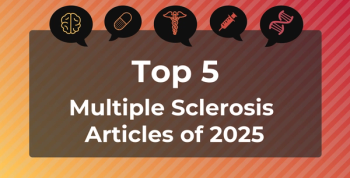
Risks of Undertreatment in MS and Impact of Early High Efficacy Therapy
Darin Okuda, MD discusses the risk of undertreating MS patients and the avoidance of undertreatment with newer high-efficacy therapies.
Episodes in this series

Neil Minkoff, MD: Dr Okuda, you mentioned earlier that there were some concerns about overtreatment at times, but the major concern is undertreatment. Whether it’s undertreatment in general, or maybe the data around some of the newer therapies, like the ASCLEPIOS trials, give us some factual grounding in terms of what we’re missing or what we could gain by being tighter in our therapies.
Darin Okuda, MD: I look at that as being somewhat of a 2-path description. On the 1 hand, you have outcomes that relate to individuals not being treated optimally. It’s more primal. It’s multiple calls to the office. It’s multiple video visits or face-to-face visits. It’s additional medical visits. It’s additional testing to get them onboarded to a new therapy. Prior authorization takes time from all key stakeholders: medical offices, payer offices, etc. You have all that somewhat churning. There’s that aspect to it, and on the other side, there’s the aspect of inadequate disease control. You miss an opportunity, the patient has a bad exacerbation. As a consequence, they may need hospitalization, an inpatient stay with plasma exchange, high-dose steroids followed by inpatient rehab, and all the negative things they carry forward with that inflammatory attack if that person remains covered under your program.
There are some data out there with respect to what it looks like when we start a person on a high-efficacy regimen or if we use something that’s more moderate. There’s a publication by [Katharine] Harding and their experience out of the United Kingdom that encompassed nearly 600 patients in which they looked at this. One hundred of them were treated with what they deemed to be high efficacy involving alemtuzumab and natalizumab in comparison with other therapies that they lumped into this moderately effective group. Long story short, the 5-year EDSS [Expanded Disability Status Scale] outcomes—which may be too deep for a payer, because I don’t know how long a person is typically covered under 1 payer—showed a difference that benefited those on more robust treatment. Treating hard, treating early seemed to be the better approach, but the outcomes may actually be very simple to explain. There’s 1 characteristic that these therapies—Ocrevus, Kesimpta, Tysabri, Lemtrada, Mavenclad—are deemed to have: They force patients to be compliant. You get exposed to this drug, and it has a durable effect in comparison with Tecfidera, which you may not take every 12 hours, or generic dimethyl fumarate, in which there are over 10 generic variants that are FDA approved. That’s really going to change the scope of disease outcome when you have the playing field set up that way.
Now we have a fantastic treatment, Kesimpta. From a payer perspective, I look at this in a different way. We have Ocrevus that our patients use, and we’ve been advocates for its use since approval, but it’s very costly. The average wholesale price for the drug is pretty reasonable, but the services packaged together can be quite extreme. We’ve seen bills submitted that are in excess of $300,000 per year. During the time of COVID-19, there was a big issue where infusion suites closed down in Texas. People couldn’t even get their infusion if they wanted to in a private facility; it was closed because of COVID-19. How nice it is to have this anti-CD20 that you can administer to yourself when you get up to full pace every 4 weeks at home on your time schedule. It’s not as if you’re trying to reschedule a dinner at a 3-Michelin-star restaurant. That’s what it’s like for some people when they’re trying to get their infusion appointment and having to reschedule because of some other factor in life that has come up.
From a cost-saving standpoint for a payer, Kesimpta is ideal. The studies also supported benefit compared with teriflunomide. Obviously, you saw lower discontinuation rates in the extension. It was superior to teriflunomide in both trials by reducing relapse rates by over 50%. It’s a therapy that’s very robust. They all fall into the same anti-CD20 class, whether you want to include Pfizer’s generic rituximab as well as Teva’s Truxima. We are soon to have ublituximab by TG Therapeutics as well. The space is getting very crowded.
The key pivotal trials have told us that a great anti-CD20 can be administered at home safely while having a durable robust effect. Anti-CD20s, as a class, may be similar, but there are RNA differences. Kesimpta may have less of an effect on germinal centers within the spleen. That could be of great value in the setting of COVID-19. It could be wonderful if you’re trying to mount a more robust response to a COVID-19 vaccine. We all know it seems we’ll need a booster or at least an annual shot. There are differences there. Recrudescence of B cells seems to be faster with Kesimpta than with Ocrevus. It’s much more convenient to be able to administer it at home and it get into the lymphatic system directly, where it’s having a given positive effect, rather than having it infused intravenously. That’s maybe a key differentiating feature when comparing it with Ocrevus. If I were to put my payer hat on for a second, why would you cover Ocrevus when we have Kesimpta?
Transcript edited for clarity.
Newsletter
Stay ahead of policy, cost, and value—subscribe to AJMC for expert insights at the intersection of clinical care and health economics.









